Simon Guerrier's Blog, page 79
January 3, 2014
The Anachronauts for £2.99
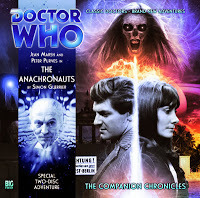 For the next 48 hours, you can buy the download version of my Doctor Who story The Anachronauts for £2.99, thanks to those nice people at Big Finish.
For the next 48 hours, you can buy the download version of my Doctor Who story The Anachronauts for £2.99, thanks to those nice people at Big Finish.It stars Jean Marsh and Peter Purves in a four-part adventure which I borrowed from the TV series Lost and the film Funeral in Berlin. Jean does a magnificent impression of Greta Garbo.
Published on January 03, 2014 08:41
January 1, 2014
Machiavelli on shunning flattery
Happy new year. A few people have been dolling out advice and life tips (my favourite so far: Caitlin Moran's drunken advice to women from last night), which reminded me of the following. It doesn't just apply to princes. I reckon it's rather good for writers.
“… there is no way to guard against flattery but by letting it be seen that you take no offense in hearing the truth: but when every one is free to tell you the truth respect falls short. Wherefore a prudent Prince should follow a middle course, by choosing certain discreet men from among his subjects, and allowing them alone free leave to speak their minds on any matter on which he asks their opinion, and on none other. But he ought to ask their opinion on everything, and after hearing what they have to say, should reflect and judge for himself. And with these counsellors collectively, and with each of them separately, his bearing should be such, that each and all of them may know that the more freely they declare their thoughts the better they will be liked. Besides these, the Prince should hearken to no others, but should follow the course determined on, and afterwards adhere firmly to his resolves. Whoever acts otherwise is either undone by flatterers, or from continually vacillating as opinions vary, comes to be held in light esteem …
Hence it follows that good counsels, whencesoever they come, have their origin in the prudence of the Prince, and not the prudence of the Prince in wise counsels.”
Machiavelli, The Prince (1514), XXIII. That Flatterers Should Be Shunned.
Published on January 01, 2014 11:05
December 27, 2013
Hitchcock on love
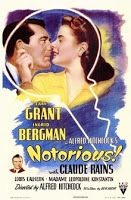 I bought the brother
Hitchcock Truffaut
for Christmas, a book-long series of conversations between the two directors. At one point they discuss Hitchcock's Notorious (1946), and the two-and-a-half minute snog where Cary Grant and Ingrid Bergman don't let go of one another even as they move round the room.
I bought the brother
Hitchcock Truffaut
for Christmas, a book-long series of conversations between the two directors. At one point they discuss Hitchcock's Notorious (1946), and the two-and-a-half minute snog where Cary Grant and Ingrid Bergman don't let go of one another even as they move round the room.A.H. I was on a train going from Boulogne to Paris and we were moving slowly through the small town of Etaples. It was on a Sunday afternoon. As we were passing a large, red brick factory, I saw a young couple against the wall. The boy was urinating against the wall and the girl never let go of his arm. She'd look down at what he was doing, then look at the scenery around them, then back again at the boy. I felt this was true love at work.
F.T. Ideally, two lovers should never separate.
A.H. Exactly. It was the memory of that incident that gave me an exact idea of the effect I was after with the kissing scene in Notorious.
Hitchcock Truffaut (1984), p. 262.
You can listen to the conversations between Hitchcock and Truffaut (hours and hours of them!) here.
Published on December 27, 2013 02:45
December 24, 2013
Doctor Who: 2013
Episode 799:
The Day of the Doctor
First broadcast at 7.50 pm, Saturday 23 November 2013
<< back to 2012
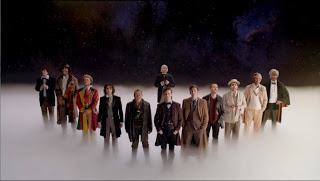 Happy birthday, Doctor Who And so, at last, I reach the end of this daft project to find one image from each calendar year of Doctor Who and use it an excuse to waffle on in praise of some aspect of the show. It was my attempt to mark the 50th anniversary and for this last installment I want to talk about the 50th anniversary itself.
Happy birthday, Doctor Who And so, at last, I reach the end of this daft project to find one image from each calendar year of Doctor Who and use it an excuse to waffle on in praise of some aspect of the show. It was my attempt to mark the 50th anniversary and for this last installment I want to talk about the 50th anniversary itself.
Wasn't it brilliant?
Andrew Ellard's wise tweetnotes on the episode, which I largely agree with, concluded:
I loved The Day of the Doctor, with its fast and funny and redemptive plot. But I especially loved how it encompassed all of Doctor Who - right back to the title sequence, theme music and even the school from the very first episode. Then, after a single shot taking us into the TARDIS (this time in 3D!), we're in Trafalgar Square - where Rose and Mickey had lunch in some of the very first moments of the show when it returned in 2005.
How bold and ridiculous to explain the Doctor's connection to Elizabeth I - first glimpsed in The Shakespeare Code (2007) and The End of Time part one (2009). How magnificent to see UNIT make peace with an alien species rather than blasting them from the Earth. How brilliant to resolve the Time War with a happy ending, yet without revoking any part of the past eight years of the show.
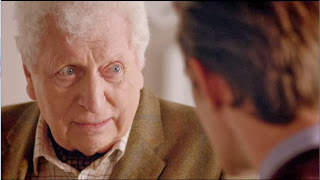 There's nods to all the eras and Doctors - and the suggestion of all sorts of tales we've never even dreamed of, with a brief glimpse of Sara Kingdom stood with Mike Yates. How extraordinary to get Tom Baker into it, how amazing that it remained a surprise, and how perfect was that scene? I found it so moving that it wasn't until my third time of watching that I picked up on the inference that this is a far-future Doctor. Gosh! and sssh! and aaaah!
There's nods to all the eras and Doctors - and the suggestion of all sorts of tales we've never even dreamed of, with a brief glimpse of Sara Kingdom stood with Mike Yates. How extraordinary to get Tom Baker into it, how amazing that it remained a surprise, and how perfect was that scene? I found it so moving that it wasn't until my third time of watching that I picked up on the inference that this is a far-future Doctor. Gosh! and sssh! and aaaah!
What really struck me about the episode, though, was the sense of extraordinary joy. And that was matched in the other special programming round the episode - The Night of the Doctor, An Adventure in Space and Time, the Five-ish Doctors, my chum Matthew's documentary, and everything else. All in all, it seemed perfectly to provide something for fans of every era and style of this sprawling, madcap show.
It's not just been on TV. There's been the return of the missing nine episodes - which I assume was carefully stage-managed to happen just ahead of the anniversary. And this year has seen some of the best and boldest spin-off Doctor Who. (At least, I gather it is: I'm hoping for The Light at the End , the 11 Doctors, 11 Stories book and The Vault for Christmas - but that rather depends on whether I've been good.) Plus there's been events all over the country and abroad, and 94 countries got to watch the special episode together.
Perhaps, amid all these treats, some fans may have missed what Doctor Who Adventures did the week of the anniversary. But I think, more than anything else, it might be the one thing to really bring home the scale of Doctor Who's achievement in lasting half a century.
The comic strip of Doctor Who Adventures issue # 333 (6-26 November) broke its own solemn rules and featured a past Doctor. "Time Trick" - written by Craig Donaghy, with art by John Ross and colour by Alan Craddock - didn't just feature any past Doctor, but the original as played by William Hartnell.
Doctor Who Adventures is aimed at 8-12 year-olds - children who've now grown up in an age where the longest gap between new episodes of Doctor Who has been a mere nine months. Hartnell died in 1975 - before the parents of some of those readers had been born. He played the Doctor between 1963 and 1966 - when the grandparents of those readers were children.
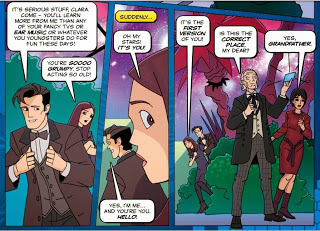 "Time Trick" from Doctor Who Adventures #333 (6-26 Nov 13)
"Time Trick" from Doctor Who Adventures #333 (6-26 Nov 13)
written by Craig Donaghy, art by John Ross
and colour by Alan Craddock.The end.
First broadcast at 7.50 pm, Saturday 23 November 2013
<< back to 2012
 Happy birthday, Doctor Who And so, at last, I reach the end of this daft project to find one image from each calendar year of Doctor Who and use it an excuse to waffle on in praise of some aspect of the show. It was my attempt to mark the 50th anniversary and for this last installment I want to talk about the 50th anniversary itself.
Happy birthday, Doctor Who And so, at last, I reach the end of this daft project to find one image from each calendar year of Doctor Who and use it an excuse to waffle on in praise of some aspect of the show. It was my attempt to mark the 50th anniversary and for this last installment I want to talk about the 50th anniversary itself.Wasn't it brilliant?
Andrew Ellard's wise tweetnotes on the episode, which I largely agree with, concluded:
In short: A vastly entertaining barnstormer that put the title character front and centre.I'd worried that nothing could surpass The Five Doctors (1983), and there'd been rumours and grumblings about what might be happening behind the scenes. And yet, and yet...
I loved The Day of the Doctor, with its fast and funny and redemptive plot. But I especially loved how it encompassed all of Doctor Who - right back to the title sequence, theme music and even the school from the very first episode. Then, after a single shot taking us into the TARDIS (this time in 3D!), we're in Trafalgar Square - where Rose and Mickey had lunch in some of the very first moments of the show when it returned in 2005.
How bold and ridiculous to explain the Doctor's connection to Elizabeth I - first glimpsed in The Shakespeare Code (2007) and The End of Time part one (2009). How magnificent to see UNIT make peace with an alien species rather than blasting them from the Earth. How brilliant to resolve the Time War with a happy ending, yet without revoking any part of the past eight years of the show.
 There's nods to all the eras and Doctors - and the suggestion of all sorts of tales we've never even dreamed of, with a brief glimpse of Sara Kingdom stood with Mike Yates. How extraordinary to get Tom Baker into it, how amazing that it remained a surprise, and how perfect was that scene? I found it so moving that it wasn't until my third time of watching that I picked up on the inference that this is a far-future Doctor. Gosh! and sssh! and aaaah!
There's nods to all the eras and Doctors - and the suggestion of all sorts of tales we've never even dreamed of, with a brief glimpse of Sara Kingdom stood with Mike Yates. How extraordinary to get Tom Baker into it, how amazing that it remained a surprise, and how perfect was that scene? I found it so moving that it wasn't until my third time of watching that I picked up on the inference that this is a far-future Doctor. Gosh! and sssh! and aaaah!What really struck me about the episode, though, was the sense of extraordinary joy. And that was matched in the other special programming round the episode - The Night of the Doctor, An Adventure in Space and Time, the Five-ish Doctors, my chum Matthew's documentary, and everything else. All in all, it seemed perfectly to provide something for fans of every era and style of this sprawling, madcap show.
It's not just been on TV. There's been the return of the missing nine episodes - which I assume was carefully stage-managed to happen just ahead of the anniversary. And this year has seen some of the best and boldest spin-off Doctor Who. (At least, I gather it is: I'm hoping for The Light at the End , the 11 Doctors, 11 Stories book and The Vault for Christmas - but that rather depends on whether I've been good.) Plus there's been events all over the country and abroad, and 94 countries got to watch the special episode together.
Perhaps, amid all these treats, some fans may have missed what Doctor Who Adventures did the week of the anniversary. But I think, more than anything else, it might be the one thing to really bring home the scale of Doctor Who's achievement in lasting half a century.
The comic strip of Doctor Who Adventures issue # 333 (6-26 November) broke its own solemn rules and featured a past Doctor. "Time Trick" - written by Craig Donaghy, with art by John Ross and colour by Alan Craddock - didn't just feature any past Doctor, but the original as played by William Hartnell.
Doctor Who Adventures is aimed at 8-12 year-olds - children who've now grown up in an age where the longest gap between new episodes of Doctor Who has been a mere nine months. Hartnell died in 1975 - before the parents of some of those readers had been born. He played the Doctor between 1963 and 1966 - when the grandparents of those readers were children.
 "Time Trick" from Doctor Who Adventures #333 (6-26 Nov 13)
"Time Trick" from Doctor Who Adventures #333 (6-26 Nov 13)written by Craig Donaghy, art by John Ross
and colour by Alan Craddock.The end.
Published on December 24, 2013 06:50
December 23, 2013
Out of the Hitler Time by Judith Kerr

Judith Kerr wrote her extraordinary, semi-autobiographical novel When Hitler Stole Pink Rabbit (1971) in response to The Sound of Music. She was horrified that her son thought the film showed how her own childhood had been. So she wrote the story of nine year-old Anna, who's family fled Berlin in 1933, just as Hitler came to power.
I'd read it before as kid - it's still used in classrooms in the UK and Germany - and remembered the haunting simplicity of it, the way she doesn't quite spell out the dangers the family are facing. We understand the Nazi policy towards Jews from fleeting examples, such as two children who aren't allowed to play with Anna and her brother, and a growing sense of dread because of how Anna's parents behave.
At one point, the family heads from Switzerland to Paris, and a guard directs them to their train. Except, just as the train is about to depart, Anna realises it's a train for Stuttgart. They just escape in time, and the implication is that if they had gone back to Germany, they would not have survived. But worse is the hanging question of whether the guard directed them to the wrong train on purpose.
What's brilliant is how the events are filtered through Anna's perspective, so that we - the readers - often know more than she does about what's going on and what is to come. The family's great friend Onkel Julius insists on staying in Berlin, and that things will work out soon enough... As the situation worsens, we learn he takes solace in going to the zoo. So the true horror of the Nazis is brought home at the end of the book by a letter from Julius. It's a suicide note.
"And then, just before Christmas, the blow had fallen. Onkel Julius had received an official letter revoking his pass to the Zoo. No reason was given. The fact that he had a Jewish grandmother was enough."In the recent Imagine documentary, Hitler, the Tiger and Me, Kerr confirmed to Alan Yentob that this was a true a story, and Julius a real friend of her father's. Kerr's response is extraordinary:
Judith Kerr, When Hitler Stole Pink Rabbit, p. 230.
"Apparently, in 1938 they made a law that Jewish families couldn't keep pets and they had to be collected. You weren't allowed to kill your pet, you had to hand it over and didn't know what was going to happen to it. And then in 1942, when they must have had other things on their mind, somebody decided that mixed families - you know, if there was a marriage between a Jew and an Aryan and they'd stayed together - that they couldn't keep pets either. Who thinks of things like that? I mean, why?"It's this response to the Nazis - not one of horror but of bafflement at the petty needlessness of the cruelty - that really lingers after the end of the book, when Anna and her family reach London in 1936.
Judith Kerr speaking on Hitler, The Tiger and Me, BBC One, 26 November 2013.
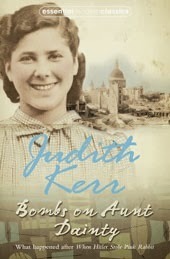 The story is then continued in
Bombs on Aunt Daisy
(originally The Other Way Round (1975)), with Anna in her teens during the war. Again, it's told in sparing, simple prose where she doesn't tell us everything and gets us to puzzle out the meaning.
The story is then continued in
Bombs on Aunt Daisy
(originally The Other Way Round (1975)), with Anna in her teens during the war. Again, it's told in sparing, simple prose where she doesn't tell us everything and gets us to puzzle out the meaning.Perhaps most horrific is the sequence on pages 89-90, where Anna's father asks a doctor friend to supply him with something secret. Anna, overhearing, doesn't quite know what's been asked for, and all we get is her parent's stricken response when she asks them. It's clear to us, though it's never said, that it's suicide pills.
Kerr's good, too, at the mounting dread among the community of refugees in London, listening to the news as Nazi forces trample yet more of Europe. And then, when we can hardly believe that there's any cause for hope, there's this transcendent moment:
"A familiar voice said, 'This is the BBC Home Service. Here is the news, and this is Bruce Belfrage reading it.'For all the excitement and danger of the war - including a couple of moments when Anna is nearly killed - the story is really about how life carried on regardless: Anna going to the cinema, studying shorthand, eating a knickerbocker glory, buying her first pair of trousers and falling in love for the first time. She's especially good on telling details about how war intruded into life, such as the early days of the air raids.
The voice did not quiet sound as usual and Anna thought, what's the matter with him? It had a breathlessness, a barely discernible wish to hurry, which had never been there before. She was listening so hard to the intonation of each word that she hardly took in the sense. Air battles over most of England... Heavy concentrations of bombers... An official communique from the Air Ministry... And then it came. The voice developed something like a tiny crack which completely robbed it of its detachment, stopped for a fraction of a second and then said slowly and clearly, 'One hundred and eighty-two enemy aircraft shot down.'
There was a gasp from the people in the lounge, followed by murmured questions and answers as those who did not understand much English asked what the newsreader had said, and the others checked with each other that they had heard aright. And then the elderly Pole was leaping up from his chair and shaking Mr Chetwin by the hand.
'It is success!' he cried. 'You English show Hitler he not can win all the time! Your aeroplanes show him!' and the other Poles and Czechs crowded round, patting Mr Chetwin on the back, pumping his hand and congratulating him.
His grey hair became untidier than ever and he looked bemused but glad. 'Very kind of you,' he kept saying, 'though it wasn't me, you know.'"
Judith Kerr, Bombs on Aunt Daisy, pp. 98-9.
"It was curious, thought Anna, how quickly one could get used to sleeping on the floor. It was really quite snug. There were plenty of blankets, and the heavy wooden shutters over the lounge windows not only muffled the noise but gave her a feeling of security. She never got enough sleep, but nor did anyone else, and this was another thing one got used to. Everywhere you went during the day there were people having little catnaps to catch up - in the parks, on the buses and tubes, in the corners of tea-shops. One girl even fell asleep over her shorthand machine at the secretarial school. When they talked to each other they would yawn hugely in the middle of a sentence and go straight on with what they were saying without even bothering to apologise."At the same time, there's plenty on the horror of war - the sudden deaths of young men, the effect on Anna's parents and the awful state of one old refugee who was roundly beaten by the Nazis.
Ibid., p. 114.
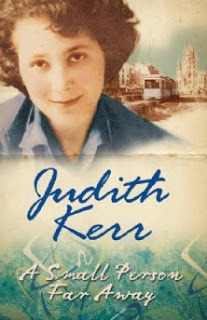 The final book in the trilogy, A Small Person Far Away (1978) is set over a week in 1956, when Anna - now married to a famous TV writer and with a new job as a writer herself - must rush to Berlin because her mum has attempted suicide.
The final book in the trilogy, A Small Person Far Away (1978) is set over a week in 1956, when Anna - now married to a famous TV writer and with a new job as a writer herself - must rush to Berlin because her mum has attempted suicide.In part, it explores the awful shadow cast by the war. Anna's mother is now involved with a man who's job is to help Jewish citizens seek compensation for all those they have lost - though, as one client Anna meets hauntingly demonstrates, how can anyone be compensate for the loss of all their loved ones? Anna's mother has been working as a translator in the war crimes hearings. But it's not this daily reminder of all the horrors committed by the Nazis that finally gets to her but something much more mundane: her lover has had an affair.
This awful ordinariness, this anticlimax, makes for a very different feel of story. Gone is the childlike sense of adventure and optimism, and instead there's a quiet despair.
It's assumed that, as the daughter, Anna will stay to look after her mother - whatever her commitments to her work and husband. And when her mother wakes, she only has eyes for her son. Whereas the previous books had Anna escaping the best efforts of Nazis to kill her, here the greatest moment of tension is when she's at a party, waiting for her husband to ring.
It's not that the book is such a great leap from the two before. It allows Anna to revisit the Berlin home she fled all those years before, and to tell us what happened to some of the characters we've met in the first two novels. And it ends with Anna flying back to London, let off from her duties to her mother because of the threat of war. The focus is still, during a crisis, to cling tight to those who matter, but that's no longer her mother and brother but her husband.
All the books deal with struggles of the artist - the effects of the exile on her father's writing, Anna's own education as an artist and the sensibility to find even the worst events "interesting", and then her struggles to balance her work with the needs of her family. Each book is written to the level of Anna's age - the first one for children, the second for teens and the third for grown-ups.
But this last book is the least dramatic, most personal and the most unsettling of the three. For all the horrors of the war, Anna's perspective on events and the simple style make the first two books enchanting, whereas the conclusion is hard work. But, perhaps because of that, it's the one I find myself picking over most, days after I finished it.
Published on December 23, 2013 09:09
December 22, 2013
Doctor Who: 2012
Episode 790:
The Snowmen
First broadcast at 5.15 pm, Tuesday 25 December 2012
<< back to 2011
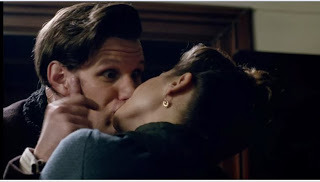 Clara snogs the Doctor
Clara snogs the Doctor
The Snowmen (2012)On 3 September 2012, Caitlin Moran asked Twitter:
Generally, it's quite easy to define a companion. There's three of them in the first episode: Susan, Barbara and Ian. When they leave, a new companion takes their place. Susan, leaves in Flashpoint (the final episode of The Dalek Invasion of Earth), and a week later the Doctor meets Vicki. Ian and Barbara leave the TARDIS in The Planet of Decision (the final episode of The Chase), not knowing that Steven is already on board.
That's generally the rule: a companion leaves and a new one is introduced, usually in the same story or one story apart. Most companions last about a year in the series.
But there are plenty of exceptions to this general rule. In The Horse of Destruction (the final episode of The Myth Makers), Vicki leaves and is replaced by Katarina – who is then killed off four weeks later in The Traitors. That episode introduces Sara Kingdom, who travels with the Doctor and Steven for the next eight weeks before also being killed.
Do Katarina and Sara count as companions? Neither are listed in the Characters from Season 3 page on the BBC's own Doctor Who website - if that means anything. But other lists say one or both of them do.
I once asked the actress Jean Marsh if she considered Sara to be a companion. She told me, firmly, no: it was made clear to her at the time that companions got a better rate of pay than she was on. But does what the production team decide have any bearing?
There's also an argument that Katarina counts because, although she's in just five episodes, they're spread across two separate stories – The Myth Makers and The Daleks' Master Plan. Sara's nine episodes are all part of that latter story, so she doesn't count.
(Jean Marsh has since appeared in lots more episodes as Sara for Big Finish - most of them written by me. I think if she wasn't a bona fide companion before, she is now because of those adventures. You are welcome.)
But if companions need to be in more than story, that would rule out Grace Holloway, who only appears in the TV movie (1996). And if she counts as a companion, does Chang Lee? He appears in the same story, travels in the TARDIS and is on good terms with the Doctor at the end.
Does a companion need to travel in the TARDIS? Liz Shaw never did. The Brigadier travelled by TARDIS in The Three Doctors (1972-3), and appeared in numerous stories - but does he count as a companion? If he does, what about other regulars from UNIT - Benton and Yates in the old days, or Kate Lethbridge-Stewart today?
 Doctor Who Magazine
Doctor Who Magazine
#367 (March 2006)Mickey wasn't a companion when we first met him in Rose (2005), but became one when he joined the TARDIS in School Reunion (2006), though he left again after three episodes. Publicity referred to him as the TV show's first black companion - but that's also what was said about Martha Jones when she joined the TARDIS a year later.
In fact, since the series came back in 2005, it's been tricky working out who counts as a companion. There are the main ones: Rose, Captain Jack, Donna, Martha, Amy and Rory, and Clara. But what about everyone else?
Does Adam count as a companion? He travelled in the TARDIS in two separate stories - Dalek and The Long Game (2005), but the point in the second story is that he's not a suitable candidate, so the Doctor drops hims home.
Perhaps how the production team viewed Adam and Mickey's status can be gauged from the fact that, when they joined the TARDIS, the actors playing them weren't credited in the opening titles. When Mickey returned in Journey's End (2008), actor Noel Clarke was credited after the opening titles. We might use those titles as an indicator of who counts:
Credited in the titles of Journey's End, therefore a companion:Catherine Tate (Donna), Freema Agyeman (Martha), John Barrowman (Captain Jack), with Elisabeth Sladen (Sarah) and Billie Piper (Rose).
Credited after the titles of Journey's End, so not a companion:Noel Clarke (Mickey), Camille Coduri (Jackie), Adjoa Andoh (Francine), Eve Myles (Gwen), Gareth David-Lloyd (Ianto).
That feels sort of right, but then the opening titles for the episodes following Journey's End credit people we might not think of as companions: David Morrisey (Jackson) in The Next Doctor (2008), Michelle Ryan (Christina) in Planet of the Dead (2009), Lindsay Duncan (Adelaide) in The Waters of Mars (2009) and Bernard Cribbins (Wilf) in The End of Time (2009-10).
Except for Wilf, these characters only appear in one episode and I don't think really count as companions - but then who am I to decide?
Well, entirely ignoring what I've said before about none of us getting to say what counts and what doesn't, I've a modest proposal. It goes like this:
Snog = companion
Yes, if we see the Doctor kiss someone, then they're a companion. It only counts for companions post-1989 but then, when companions have returned to the series - so far, only Jo and Sarah Jane - they've got a big hug from the Doctor.
Anyway, the list excludes Adam, Mickey and Wilf, but I think it works pretty well. And I'm delighted by the last one:
Grace (the TV movie, 1996)Captain Jack (The Parting of the Ways, 2005)Rose (The Parting of the Ways)Madame de Pompadour (The Girl in the Fireplace, 2006)Jackie (in Army of Ghosts (2006) when she also travels in the TARDIS)Martha (Smith and Jones, 2007)Joan (Human Nature, 2007)Astrid (Voyage of the Damned, 2007)Donna (The Unicorn and the Wasp, 2008)Christina (Planet of the Dead, 2009)Amy (The Time of Angels, 2010)River (The Day of the Moon, 2011)The TARDIS (The Doctor's Wife, 2011)Rory (Dinosaurs on a Spaceship (2012)Kate Lethrbridge-Stewart (The Power of Three, 2012 - though it's only a peck on the cheek)Clara (The Snowmen, 2012)Elizabeth I (The Day of the Doctor, 2013)
Next episode: 2013
First broadcast at 5.15 pm, Tuesday 25 December 2012
<< back to 2011
 Clara snogs the Doctor
Clara snogs the DoctorThe Snowmen (2012)On 3 September 2012, Caitlin Moran asked Twitter:
"I know I'm going to regret this, but: what is the OFFICIAL number of companions the Doctor has had?"It's a question that doesn't have an answer, for reasons I'm about to explain. But I did try to puzzle it out once for a work thing - and, at least for the series post-1989, I've a modest proposal...
Generally, it's quite easy to define a companion. There's three of them in the first episode: Susan, Barbara and Ian. When they leave, a new companion takes their place. Susan, leaves in Flashpoint (the final episode of The Dalek Invasion of Earth), and a week later the Doctor meets Vicki. Ian and Barbara leave the TARDIS in The Planet of Decision (the final episode of The Chase), not knowing that Steven is already on board.
That's generally the rule: a companion leaves and a new one is introduced, usually in the same story or one story apart. Most companions last about a year in the series.
But there are plenty of exceptions to this general rule. In The Horse of Destruction (the final episode of The Myth Makers), Vicki leaves and is replaced by Katarina – who is then killed off four weeks later in The Traitors. That episode introduces Sara Kingdom, who travels with the Doctor and Steven for the next eight weeks before also being killed.
Do Katarina and Sara count as companions? Neither are listed in the Characters from Season 3 page on the BBC's own Doctor Who website - if that means anything. But other lists say one or both of them do.
I once asked the actress Jean Marsh if she considered Sara to be a companion. She told me, firmly, no: it was made clear to her at the time that companions got a better rate of pay than she was on. But does what the production team decide have any bearing?
There's also an argument that Katarina counts because, although she's in just five episodes, they're spread across two separate stories – The Myth Makers and The Daleks' Master Plan. Sara's nine episodes are all part of that latter story, so she doesn't count.
(Jean Marsh has since appeared in lots more episodes as Sara for Big Finish - most of them written by me. I think if she wasn't a bona fide companion before, she is now because of those adventures. You are welcome.)
But if companions need to be in more than story, that would rule out Grace Holloway, who only appears in the TV movie (1996). And if she counts as a companion, does Chang Lee? He appears in the same story, travels in the TARDIS and is on good terms with the Doctor at the end.
Does a companion need to travel in the TARDIS? Liz Shaw never did. The Brigadier travelled by TARDIS in The Three Doctors (1972-3), and appeared in numerous stories - but does he count as a companion? If he does, what about other regulars from UNIT - Benton and Yates in the old days, or Kate Lethbridge-Stewart today?
 Doctor Who Magazine
Doctor Who Magazine#367 (March 2006)Mickey wasn't a companion when we first met him in Rose (2005), but became one when he joined the TARDIS in School Reunion (2006), though he left again after three episodes. Publicity referred to him as the TV show's first black companion - but that's also what was said about Martha Jones when she joined the TARDIS a year later.
In fact, since the series came back in 2005, it's been tricky working out who counts as a companion. There are the main ones: Rose, Captain Jack, Donna, Martha, Amy and Rory, and Clara. But what about everyone else?
Does Adam count as a companion? He travelled in the TARDIS in two separate stories - Dalek and The Long Game (2005), but the point in the second story is that he's not a suitable candidate, so the Doctor drops hims home.
Perhaps how the production team viewed Adam and Mickey's status can be gauged from the fact that, when they joined the TARDIS, the actors playing them weren't credited in the opening titles. When Mickey returned in Journey's End (2008), actor Noel Clarke was credited after the opening titles. We might use those titles as an indicator of who counts:
Credited in the titles of Journey's End, therefore a companion:Catherine Tate (Donna), Freema Agyeman (Martha), John Barrowman (Captain Jack), with Elisabeth Sladen (Sarah) and Billie Piper (Rose).
Credited after the titles of Journey's End, so not a companion:Noel Clarke (Mickey), Camille Coduri (Jackie), Adjoa Andoh (Francine), Eve Myles (Gwen), Gareth David-Lloyd (Ianto).
That feels sort of right, but then the opening titles for the episodes following Journey's End credit people we might not think of as companions: David Morrisey (Jackson) in The Next Doctor (2008), Michelle Ryan (Christina) in Planet of the Dead (2009), Lindsay Duncan (Adelaide) in The Waters of Mars (2009) and Bernard Cribbins (Wilf) in The End of Time (2009-10).
Except for Wilf, these characters only appear in one episode and I don't think really count as companions - but then who am I to decide?
Well, entirely ignoring what I've said before about none of us getting to say what counts and what doesn't, I've a modest proposal. It goes like this:
Snog = companion
Yes, if we see the Doctor kiss someone, then they're a companion. It only counts for companions post-1989 but then, when companions have returned to the series - so far, only Jo and Sarah Jane - they've got a big hug from the Doctor.
Anyway, the list excludes Adam, Mickey and Wilf, but I think it works pretty well. And I'm delighted by the last one:
Grace (the TV movie, 1996)Captain Jack (The Parting of the Ways, 2005)Rose (The Parting of the Ways)Madame de Pompadour (The Girl in the Fireplace, 2006)Jackie (in Army of Ghosts (2006) when she also travels in the TARDIS)Martha (Smith and Jones, 2007)Joan (Human Nature, 2007)Astrid (Voyage of the Damned, 2007)Donna (The Unicorn and the Wasp, 2008)Christina (Planet of the Dead, 2009)Amy (The Time of Angels, 2010)River (The Day of the Moon, 2011)The TARDIS (The Doctor's Wife, 2011)Rory (Dinosaurs on a Spaceship (2012)Kate Lethrbridge-Stewart (The Power of Three, 2012 - though it's only a peck on the cheek)Clara (The Snowmen, 2012)Elizabeth I (The Day of the Doctor, 2013)
Next episode: 2013
Published on December 22, 2013 09:24
December 19, 2013
Blake's 7: President
Those splendid fellows at Big Finish have announced details of a new Blake's 7 story what I've written. It's one I'm especially pleased with.
Blake's 7: PresidentIt's in a box-set with stories by the immensely good Marc Platt and James Goss, too. Blake's 7: The Liberator Chronicles volume 8 is out in May 2014.
Alone together, two Federation officials at last share the truth. Supreme Commander Servalan agrees to explain to Secretary Rontane how she set up the President.
And when she is done, Servalan’s executioners will be waiting…
(Starring Jacqueline Pearce as Servalan and Peter Miles as Rontane. Directed by Lisa Bowerman.)
Published on December 19, 2013 03:10
December 18, 2013
Doctor Who: 2011
Episode 781:
The God Complex
First broadcast: 7.10 pm on Saturday 17 September 2011
<< back to 2010
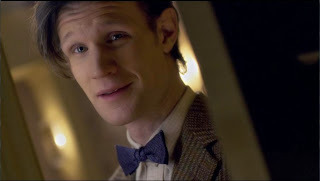 "Who else?"
"Who else?"
Doctor Who: The God Complex (2011)In The God Complex, the Doctor and his friends are trapped in a sinister hotel that isn’t what it seems. As well as the Minotaur stalking them, there’s the weird matter of the rooms. It seems (at first) that the hotel feeds on people’s fears. Somewhere, there’s a door for everyone, and beyond it the thing you’re most afraid of…
When the Doctor finds a door of his own he can’t resist taking a peek. But his response is quite unexpected. “Who else?” he says with a smile.
What did the Doctor see?
I’ve known a few people try to puzzle this out, assuming it would be the embodiment of his greatest fear. They suggest Daleks or Weeping Angels - or the Taran Wood Beast. There are some other options.
In The War Games (1969) the Doctor admits to his friends why he fled from his own people:
In The Mind of Evil (1971), he battles a machine that uses people’s fears to kill them. It torments him with visions of the Earth on fire and his failure to stop the calamity (events he witnessed in Inferno (1970), written by the same writer.)
In Planet of the Spiders (1974), he must face his greatest fear and return to the arachnid queen, even though it will kill him. But in doing so, he conquers that terror, doesn’t he?
At the end of Amy’s Choice (2010) it’s suggested that his greatest tormentor is actually the voice inside his own head. Perhaps he most fears his own capacity for evil: see his horror of the War Doctor and the Valeyard.
I also like the implied joke from the 2005 series, that Doctor Who’s afraid of the big bad wolf. Why would the Doctor fear Bad Wolf? Rose with golden eyes doesn’t just wield extraordinary powers, those powers threaten to destroy her – and him. But I think the thing the Doctor would find scary is that Bad Wolf suggests that events are pre-destined, that the Doctor is merely fulfilling a role someone else has contrived. His free will is an illusion.
(The trick, in both The Parting of the Ways (2005) and The Day of the Doctor (2013) is that he takes the initiative; but perhaps we could argue he’s been placed in just that position by the all-powerful being. How much is he free to choose?)
I’m not sure that, in The God Complex, the Doctor does confront his greatest fear. Soon after he’s seen what waits in his own room, he works out what the hotel wants from its victims:
In The Day of the Doctor he explains that when he adopted his name, he also promised to adhere to a code of conduct.
But even if that's what he believes in, it doesn’t tell us what he sees in his own hotel room. Instead, I think the key words in The God Complex are how the Doctor defines the notion of faith:
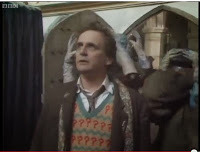 "Susan, Barbara,
"Susan, Barbara,
Ian, Vicki, Steven..."That’s just after he scares off the vampires [or Haemovores] by reciting something under his breath. We can't hear what he says but its clear from reading his lips: the Doctor’s unshakeable, monster-beating faith is a list of his former companions.
(Go see for yourself: the Doctor's act of faith on YouTube.)
In recent years, River Song and others have said it’s a bad idea for the Doctor to travel alone: he’s a better man with his companions. But that's not a new idea - it goes right back to the beginnings of the series. I argued in my 2002 piece that original companions Ian and Barbara,
In that first year of the show, Ian and Barbara make him realise his moral responsibilities in travelling through time and space: he has to get involved in events, to battle tyranny, to fight evil, yet to remain a man of peace… They’re the ones who make him change his behaviour, who hold him to a higher standard.
So who else would he see gazing back at him in his room in the hotel?
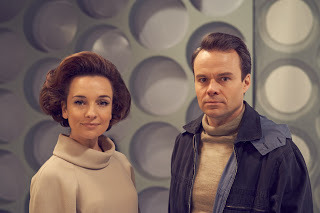 Jemma Powell and Jamie Glover
Jemma Powell and Jamie Glover
as Jacqueline Hill and William Russell
as Barbara and Ian in
An Adventure in Space and Time (2013)Next episode: 2012
First broadcast: 7.10 pm on Saturday 17 September 2011
<< back to 2010
 "Who else?"
"Who else?"Doctor Who: The God Complex (2011)In The God Complex, the Doctor and his friends are trapped in a sinister hotel that isn’t what it seems. As well as the Minotaur stalking them, there’s the weird matter of the rooms. It seems (at first) that the hotel feeds on people’s fears. Somewhere, there’s a door for everyone, and beyond it the thing you’re most afraid of…
When the Doctor finds a door of his own he can’t resist taking a peek. But his response is quite unexpected. “Who else?” he says with a smile.
What did the Doctor see?
I’ve known a few people try to puzzle this out, assuming it would be the embodiment of his greatest fear. They suggest Daleks or Weeping Angels - or the Taran Wood Beast. There are some other options.
In The War Games (1969) the Doctor admits to his friends why he fled from his own people:
Well, I was bored.Later, he’s horrified at the prospect of his travels being curtailed: he fears the loss of his freedom, of being forced to conform.
In The Mind of Evil (1971), he battles a machine that uses people’s fears to kill them. It torments him with visions of the Earth on fire and his failure to stop the calamity (events he witnessed in Inferno (1970), written by the same writer.)
In Planet of the Spiders (1974), he must face his greatest fear and return to the arachnid queen, even though it will kill him. But in doing so, he conquers that terror, doesn’t he?
At the end of Amy’s Choice (2010) it’s suggested that his greatest tormentor is actually the voice inside his own head. Perhaps he most fears his own capacity for evil: see his horror of the War Doctor and the Valeyard.
I also like the implied joke from the 2005 series, that Doctor Who’s afraid of the big bad wolf. Why would the Doctor fear Bad Wolf? Rose with golden eyes doesn’t just wield extraordinary powers, those powers threaten to destroy her – and him. But I think the thing the Doctor would find scary is that Bad Wolf suggests that events are pre-destined, that the Doctor is merely fulfilling a role someone else has contrived. His free will is an illusion.
(The trick, in both The Parting of the Ways (2005) and The Day of the Doctor (2013) is that he takes the initiative; but perhaps we could argue he’s been placed in just that position by the all-powerful being. How much is he free to choose?)
I’m not sure that, in The God Complex, the Doctor does confront his greatest fear. Soon after he’s seen what waits in his own room, he works out what the hotel wants from its victims:
It's not fear. It's faith. Not just religious faith, faith in something … Every time someone was confronted with their most primal fear, they fell back on their most fundamental faith.What does Doctor believe in?
In The Day of the Doctor he explains that when he adopted his name, he also promised to adhere to a code of conduct.
TENNANT DOCTOR:The words are taken from Terrance Dicks’ description of the Doctor in The Making of Doctor Who (1972) - which I think would make a great title for an episode - and first cited in fiction as the Doctor’s personal code in Timewyrm: Revelation by Paul Cornell (1991).
Never cruel or cowardly.
HURT DOCTOR:
Never give up, never give in.
But even if that's what he believes in, it doesn’t tell us what he sees in his own hotel room. Instead, I think the key words in The God Complex are how the Doctor defines the notion of faith:
Not just religious faith, faith in something …That chimes with his explanation to Ace in The Curse of Fenric (1989):
ACE:
I thought vampires were scared of crucifixes.
DOCTOR:
No, no, it's not the crucifix that frightens them, it's the faith of the person carrying it. It creates a psychic barrier, just like I did.
 "Susan, Barbara,
"Susan, Barbara, Ian, Vicki, Steven..."That’s just after he scares off the vampires [or Haemovores] by reciting something under his breath. We can't hear what he says but its clear from reading his lips: the Doctor’s unshakeable, monster-beating faith is a list of his former companions.
(Go see for yourself: the Doctor's act of faith on YouTube.)
In recent years, River Song and others have said it’s a bad idea for the Doctor to travel alone: he’s a better man with his companions. But that's not a new idea - it goes right back to the beginnings of the series. I argued in my 2002 piece that original companions Ian and Barbara,
“serve the purpose of ‘educating the Doctor to maturity and responsibility’”.When we first meet him, the Doctor can be cruel and cowardly - ready to kill a wounded caveman just to save his own skin. It's Ian and Barbara who change him. The first time the Doctor battles the Daleks it's because that's his only chance of recovering the missing piece of the TARDIS. A year later, because of Ian and Barbara's influence, he dares to battle the Daleks not out of personal gain but because it's the right thing to do.
In that first year of the show, Ian and Barbara make him realise his moral responsibilities in travelling through time and space: he has to get involved in events, to battle tyranny, to fight evil, yet to remain a man of peace… They’re the ones who make him change his behaviour, who hold him to a higher standard.
So who else would he see gazing back at him in his room in the hotel?
 Jemma Powell and Jamie Glover
Jemma Powell and Jamie Gloveras Jacqueline Hill and William Russell
as Barbara and Ian in
An Adventure in Space and Time (2013)Next episode: 2012
Published on December 18, 2013 00:30
December 17, 2013
The Murder of Roger Ackroyd
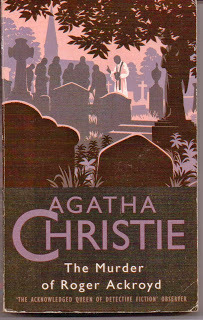 My second Agatha Christie novel is apparently one of the best.
My second Agatha Christie novel is apparently one of the best.The Murder of Roger Ackroyd was first published in 1926 - six years after Christie's debut (you might wish to read my thoughts on The Mysterious Affair at Styles ). Ackroyd feels quite familiar: a gruesome death in a posh house full of characters almost from Wodehouse, any one of whom might be the culprit. This time, the story is narrated not by the woosterish detective Captain Hastings, but the local doctor.
James Sheppard is keen to stay ahead of his gossipy sister in puzzling out the case. But, like Hastings, he's also caught between bafflement and awe at the antics of the professional sleuth, and is at pains to detail Poirot's methods and theories. Once again, this layering effect - where each piece of new evidence is judged from more than one perspective - encourages us to play along and make our own deductions. Again, there are several dark secrets involved, not all of them leading to murder. Again, the text includes maps of the scene of the crime to make it that much more tangible and real.
Poirot is again a striking, peculiar hero. His fussy, fastidious manner ought to grate, but Christie makes him a figure of curiosity to the other players. The more they comment on his strangeness, the more we come to accept it. Plus there's fun to be had in the way he speaks of himself (in the third person) and what we really might think:
“Hercule Poirot does not run the risk of disarranging his costume without being sure of attaining his object. To do so would be ridiculous and absurd. I am never ridiculous.”His first appearance is characteristically odd: he throws a marrow at Sheppard (p. 21). It's a nicely unassuming entrance. If we already know his name and reputation, that puts us one step ahead of the narrator who underestimates him.
Agatha Christie, The Murder of Roger Ackroyd, p. 95.
Just as with Styles, Poirot is in the vicinity by chance, having moved into the house next door to the doctor just in time for the murder. In fact, it's surprising that Poirot is never a suspect himself.
I've noticed that Christie likes playing with the "rules" of the detective story - in other whodunnits I know of, she reveals the detective committed the murder, or that all the suspects did it together, or... But I don't wish to spoil things if you don't already know...
Once more in Ackroyd we're given insights into how the great man cracks a case. As he tells us himself, it's all down to:
“Method, order and the little grey cells ... Then there is the psychology of the crime. One must study that.”Psychology is important. I was impressed by what seemed a very modern understanding of post-traumatic shock when Mrs Ackroyd speaks of reckless young Ralph:
Ibid., pp. 81-2.
“But, of course, one must remember that Ralph was in several air raids as a young boy. The results are apparent long after, sometimes, they say.”(Though, if this is set in 1926, I'm a bit confused by how old Ralph is meant to be if he was a "young boy" during air-raids that started in 1915.)
Ibid., p. 122.
The Dr - who is much more versed in murder than I am - says the psychological element is what most strikes her about Christie: not merely the whodunnit, but the understanding of people, and why someone might be driven to kill.
It's interesting, then, that we never get inside Poirot's head. He contends that everyone has something to hide and it's just a question of rooting out the whole tangle of secrets to work out who is the murderer. But if that's true, I found myself thinking, then Poirot himself must have something wicked to hide. So what's Poirot's secret? Not the nephew with mental health issues that he mentions a couple of times: that's a lie concocted to get other people to speak.
In fact, we know very little about him - just that he was a famous as a detective. Note that past tense. Given Christie would publish Poirot stories for another 50 years, it's odd to find that he's just retired in this one.
“They say he's done the most wonderful things – just like detectives do in books. A year ago he retired and came to live down here. Uncle knew who he was, but he promised not to tell anyone, because M. Poirot wanted to live quietly without being bothered by people.”Note, too, the off-hand use of “like in books”, to suggest reality. Later, Poirot himself says,
Ibid., p. 65.
“In all probability this is the last case I shall ever investigate”Last time, I compared Poirot to Sherlock Holmes - and it's interesting that Conan-Doyle also had Holmes retire decades before he stopped writing new stories for him. Why? What does retirement confer on the detective? I suppose there's an advantage to being no longer professional, and less involved in the formal inquiry. That spares the author the heavy lifting of a police procedural.
Ibid., p. 124.
More than that, an emeritus detective can take a step back from the case and make moral judgments as a private citizen rather than as a public servant. That makes it somehow less objectionable if they then give a sympathetic culprit a chance to escape or to kill themselves before the ignominy of trial.
Whatever the case, it's not to make Poirot a reluctant hero, forced to come back for one final job. The first time we see him in the book, he's hankering after the old days:
“But you can figure to yourself, monsieur, that a man may work towards a certain object, may labour and toil to attain a certain kind of leisure and occupation, and then find that, after all, he yearns for the old busy days, and the old occupations that he thought himself so glad to leave?”A lot of the book is taken up with conversations as different characters give their evidence or share their latest theories. That could get wearing, but Christie skillfully keeps these scenes short and sets them in different locations. I especially liked a sequence set during a game of Mah-Jong, the mechanics of play breaking up all the exposition. The book is itself a game, but again the tone is jarring: at once its comic and light, and then there's a blunt description of a corpse or the ruination of someone's whole life.
Ibid., p. 21.
If the characters are largely archetypes and ciphers - playing pieces in the game - they can seem a bit glib and inconsequential. That's most telling in the casual racism, such as when a character receives a note from a creditor with a Scottish name.
“They [creditors] are usually Scotch gentlemen, but I suspect a Semitic strain in their ancestry.”One character, Charles Kent - perhaps because he has spent time in America and picked up peculiar phrasing - even refers to Poirot as a “foreign cock duck” (p. 172).
Ibid., p. 136.
Speaking of foreigners, we learn that Captain Hastings is not merely indisposed for this adventure but now lives in “the Argentine” (p. 22). That seems rather drastic. Like in a soap opera, it's as if a major character can't just leave the series by moving to another part of town but must go to the ends of earth. In a soap, that strategy explains why that character never appears in the soap again and is barely ever mentioned. In Ackroyd, it establishes that Hastings won't make a sudden appearance or contribute to the solution. Or am I reading too much into it?
It's difficult to say much more about the story without spoiling the ingenious mystery. Unfortunately, I already knew the ending but the reveal is still brilliantly done. Without spoiling things, the ending is bleak and haunting, and I found myself picking over it for days. But for what is set-up as a fun parlour game, this is a cold and cruel story. And, for all his eccentricities, I've not yet warmed to Poirot.
Next on my list: Miss Marple's debut in The Thirteen Problems.
Published on December 17, 2013 01:57
December 15, 2013
Doctor Who: Christmas, Mega, Destiny and War
A whole bunch of Doctor Who goodies by me are now available in shops and online. "The Holly and the Ivy" is this year's festive comic strip in the new issue of
Doctor Who Adventures
. Here's a thrilling excerpt:
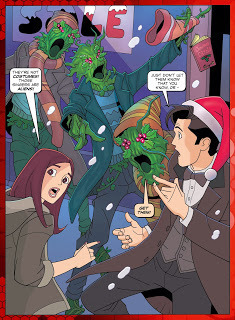 Doctor Who: The Holly and the Ivy
Doctor Who: The Holly and the Ivy
By me, art by John Ross with
colour by Alan CraddockAlso out now, The Mega is a six-part audio story featuring the third Doctor, Jo Grant and Mike Yates. I've adapted it from an original outline by Bill Strutton, with the help of magnificent script editor John Dorney.
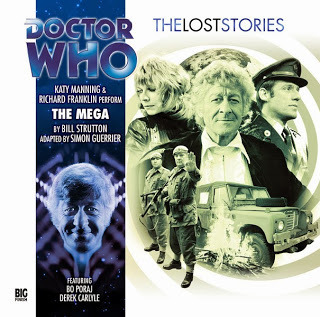 Doctor Who: The Mega
Doctor Who: The Mega
By me and Bill Strutton, artwork by Damien MayThose splendid fellows at Big Finish have also released the complete box-set of special 50th anniversary series The Destiny of the Doctor, with one adventure for each of (what we thought when we were commissioned was) the 11 incarnations of the Doctor. I wrote the second Doctor's one: The Shadow of Death . Until 31 January, you can buy the box-set for less than half price.
 The Destiny of the DoctorAnd, just to whet your appetite, Big Finish have revealed the cover to my forthcoming
The War To End All Wars
. I'm thrilled by Tom Webster's artwork. Cor. The story - which stars Peter Purves as space pilot Steven Taylor (and the first Doctor), and Alice Haig as Sida - is out in April 2014.
The Destiny of the DoctorAnd, just to whet your appetite, Big Finish have revealed the cover to my forthcoming
The War To End All Wars
. I'm thrilled by Tom Webster's artwork. Cor. The story - which stars Peter Purves as space pilot Steven Taylor (and the first Doctor), and Alice Haig as Sida - is out in April 2014.
 Doctor Who: The War To End All Wars
Doctor Who: The War To End All Wars
By me, artwork by Tom Webster
 Doctor Who: The Holly and the Ivy
Doctor Who: The Holly and the IvyBy me, art by John Ross with
colour by Alan CraddockAlso out now, The Mega is a six-part audio story featuring the third Doctor, Jo Grant and Mike Yates. I've adapted it from an original outline by Bill Strutton, with the help of magnificent script editor John Dorney.
 Doctor Who: The Mega
Doctor Who: The MegaBy me and Bill Strutton, artwork by Damien MayThose splendid fellows at Big Finish have also released the complete box-set of special 50th anniversary series The Destiny of the Doctor, with one adventure for each of (what we thought when we were commissioned was) the 11 incarnations of the Doctor. I wrote the second Doctor's one: The Shadow of Death . Until 31 January, you can buy the box-set for less than half price.
 The Destiny of the DoctorAnd, just to whet your appetite, Big Finish have revealed the cover to my forthcoming
The War To End All Wars
. I'm thrilled by Tom Webster's artwork. Cor. The story - which stars Peter Purves as space pilot Steven Taylor (and the first Doctor), and Alice Haig as Sida - is out in April 2014.
The Destiny of the DoctorAnd, just to whet your appetite, Big Finish have revealed the cover to my forthcoming
The War To End All Wars
. I'm thrilled by Tom Webster's artwork. Cor. The story - which stars Peter Purves as space pilot Steven Taylor (and the first Doctor), and Alice Haig as Sida - is out in April 2014. Doctor Who: The War To End All Wars
Doctor Who: The War To End All WarsBy me, artwork by Tom Webster
Published on December 15, 2013 02:00
Simon Guerrier's Blog
- Simon Guerrier's profile
- 60 followers
Simon Guerrier isn't a Goodreads Author
(yet),
but they
do have a blog,
so here are some recent posts imported from
their feed.



